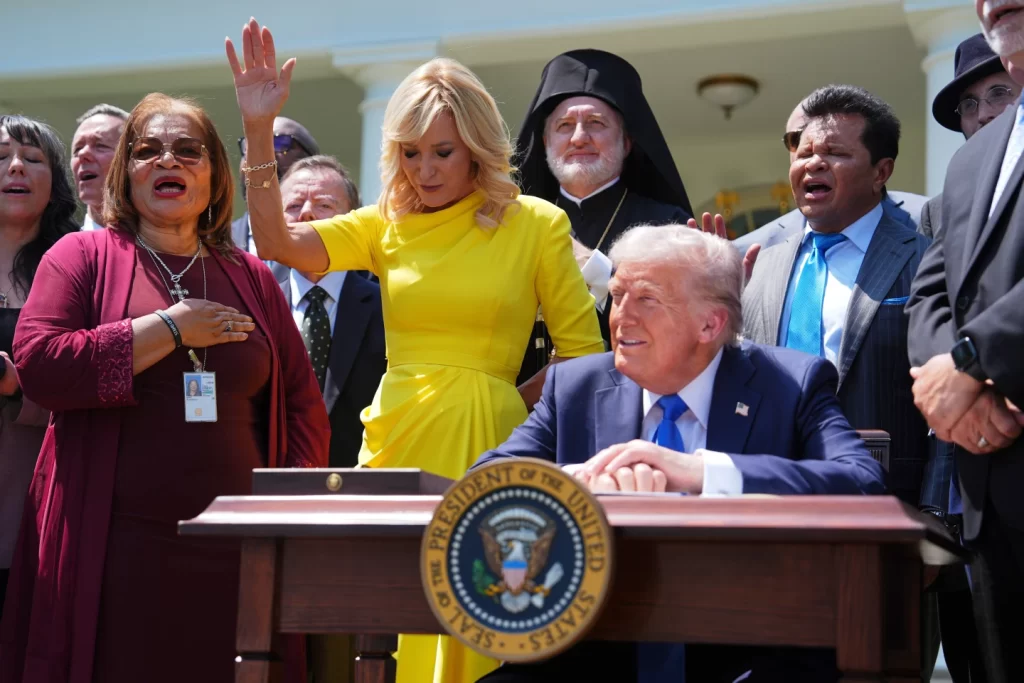
In his first half-year in office — amid his tariff campaign, government-slashing moves and immigration crackdown — President Donald Trump has also repeatedly delivered for conservative Christians, who form the bedrock of his Republican support.
While he has made overtures to Jewish, Muslim and other religious groups, his Christian supporters have been among his most high-profile surrogates and appointees.
The Trump administration has green-lit political endorsements from the pulpit and encouraged religion in the federal workplace. Trump has established faith-focused entities with numerous influential Christian appointees. He’s energized supporters with assaults on cultural and academic targets long seen as liberal bastions. His administration and his Supreme Court appointees have expanded areas for religious exemptions and expression in the public square.
“We’re bringing back religion in our country,” Trump contended at a Rose Garden event on the National Day of Prayer in May. His faith adviser, pastor Paula White-Cain, proclaimed that in his administration, faith “has been brought back to where it always belongs, and that is center.”
“A president with a true Christian agenda would be most concerned with uplifting those in our country who have been cast aside,” she said. “The most vulnerable among us are not billionaires. Those most vulnerable among us are not these manipulators of Christianity that are seeking nothing but power.”
Here are 10 ways Trump has repaid his supporters, particularly conservative evangelicals and Catholics:
Crackdowns on transgender identity and treatment
Trump has cracked down on transgender identity and medical treatment, long targets of religious conservatives.
He signed an executive order on his first day in office recognizing only male and female as biologically determined sexes. Another order aimed to eliminate federal support for gender-affirming care for young people, which several medical institutions have discontinued.
Still another order aimed to ban transgender athletes from girls’ and women’s sports. The University of Pennsylvania, under a federal civil rights investigation, modified school records previously set by transgender swimmer Lia Thomas and said it would apologize to female athletes “disadvantaged” by her participation.
Pastors, politics and the IRS
The IRS declared on July 7 that pastors can endorse political candidates from the pulpit without risking their churches’ tax-exempt status. The move effectively calls for a carve-out for religious organizations from the IRS rule known as the Johnson Amendment, enacted in 1954 and named after then-Sen. Lyndon Johnson.
That rule said churches and other nonprofits could lose their tax-exempt status if they participate in any political campaign for or against any candidate. The rule was rarely enforced, though some conservative religious leaders spent years vocally claiming it was violating their freedom of religion and speech. Trump had vowed in 2017 to “destroy” the Johnson Amendment.
Targeting Planned Parenthood
Trump signed budget legislation aimed at cutting Medicaid payments to Planned Parenthood, the nation’s biggest abortion provider and a longtime target of Christian conservative groups.
U.S. law already bars federal funding for abortion, but the latest cuts target other services offered by the organization, such as contraception and cancer screenings.
Trump in January pardoned anti-abortion activists who had been convicted of blockading abortion clinic entrances.
Evangelist-led faith office
Trump created a White House faith office led by White-Cain, a longtime pastor and evangelist in the independent charismatic world. While past presidents have had similar White House outreach to faith-based communities, this appointment puts one of Trump’s earliest high-profile Christian supporters in a strategic position. White-Cain held a similar post in the first Trump administration.
Task force on anti-Christian bias
Trump created a Task Force to Eradicate Anti-Christian Bias, chaired by Attorney General Pam Bondi and composed of high-ranking government representatives. Its two-year mandate is to “identify any unlawful anti-Christian” actions allegedly taken by the previous administration of President Joe Biden, a Democrat, and to recommend changes. The order cites grievances voiced by conservative Christian leaders in recent years, though skeptics questioned how those grievances were portrayed and whether the nation’s most dominant religious demographic needed special protections.
Religious Liberty Commission
Trump created a Religious Liberty Commission. It includes several conservative Christian clerics and commentators, some of whom have supported Trump politically. Its chair, Texas Lt. Gov. Dan Patrick, supports prayer and Ten Commandments postings in public schools.
The commission’s announcement came at a White House prayer event at which Trump said of the concept of church-state separation, “Let’s forget about that for one time.”




